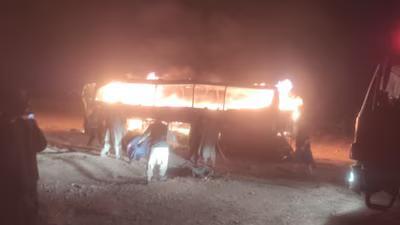
71 Killed in Bus Crash Involving Afghans Deported from Iran
Tragedy struck in western Afghanistan when a passenger bus carrying refugees, who had just been deported from Iran, caught fire after colliding with a truck and motorcycle, resulting in the loss of at least 71 lives. The accident occurred just a day after Iranian Minister of Interior Eskandar Momeni announced that a further 800,000 people would have to leave the country by next March.
According to reports, the bus was traveling from the city of Herat to the capital city of Kabul when it collided with a truck and a motorcycle on the Herat-Kandahar highway. The crash led to a fire that engulfed the bus, killing multiple people on the spot and leaving many others injured. Rescue efforts were hindered by the remote location and lack of access to medical facilities in the area.
The Afghan Ministry of Public Health confirmed the death toll and stated that rescue teams were working to reach the injured and provide medical assistance. The ministry also reported that the bus was carrying a total of 72 passengers, including men, women, and children, when the accident occurred.
The cause of the accident is still unknown, but officials investigating the incident have launched an inquiry to determine what led to the tragic event. The crash highlights the risks and dangers faced by migrants and refugees who are forced to flee their homes in search of safety and better opportunities.
The deportation of Afghans from Iran has been a contentious issue in recent years, with many rights groups and human rights organizations criticizing the practice. Iran has been accused of targeting Afghans who are either illegal immigrants or have overstayed their visas, with many being forced to return to Afghanistan without access to basic necessities such as food, shelter, and medical care.
The situation is particularly dire for Afghan refugees who have been living in Iran for years, having fled the war and violence in their home country. With no clear path to citizenship or legal status, many Afghans are forced to live in limbo, facing constant threats of arrest, deportation, and even violence.
The latest figures reveal that Iran has already deported over 700,000 Afghans in the past year, with a further 800,000 expected to be deported by next March. The sudden and severe surge in deportations has led to widespread panic and fear among the Afghan community in Iran, with many reporting that they have been subjected to physical and verbal abuse, as well as exploitation and extortion by corrupt officials.
The impact of the crash is likely to be felt deeply throughout the Afghan community, with many families facing the devastating loss of loved ones. The incident serves as a stark reminder of the risks and dangers faced by migrants and refugees who are forced to flee their homes in search of safety and better opportunities.
As the investigation into the crash continues, questions are also being raised about the preparedness of the Afghan government to respond to the influx of deportees and provide them with basic necessities such as food, shelter, and medical care. The crash highlights the need for urgent action to address the root causes of migration and provide safe and legal pathways for those seeking refuge.
In the aftermath of the crash, the Afghan government has announced plans to launch an investigation and provide compensation to the families of the victims. The government has also promised to provide medical assistance to the injured and housing to the affected families.
Meanwhile, international organizations and human rights groups have called for urgent action to address the crisis and protect the rights of Afghan refugees and migrants. The United Nations High Commissioner for Refugees (UNHCR) has urged Iran and Afghanistan to work together to find a solution to the crisis and ensure that the rights of Afghan refugees are protected.
As the world mourns the tragic loss of life in the Afghanistan bus crash, it is clear that the issue of migration and refugees is a complex and deeply politicized one. The crash serves as a stark reminder of the human cost of migration and the need for urgent action to address the root causes of migration and provide safe and legal pathways for those seeking refuge.



